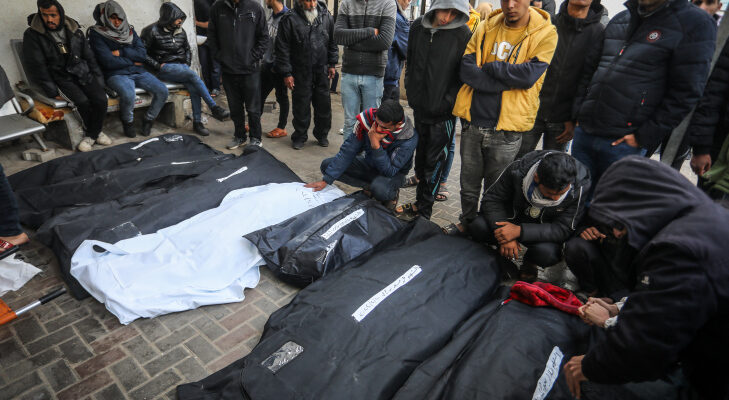|
Getting your Trinity Audio player ready...
|
A new analysis of death tolls in the Gaza Strip suggests that the Hamas-run Gaza health ministry is massively inflating the number of civilian casualties in the current war between Hamas and Israel.
According to the Gaza Health Ministry, a department of Hamas’ de facto government in the Gaza Strip, since October 7th, there have been 31,112 people killed in the coastal enclave as a result of the war with Israel, which began following Hamas’ invasion of southwestern Israel and massacre of some 1,200 Israelis.
Of the 31,112, the majority, according to the Gaza Health Ministry figures, are civilians, with more than two-thirds, or over 21,000, being women and children, with 1,049 more listed as elderly.
While the figures provided by the Hamas-run ministry have not been independently verified, they have been cited without caveat not only by Western media outlets covering the war, but also by foreign governments, including the Biden administration.
President Biden himself lamented that “too many of the over 27,000” Gazans reportedly killed up that point according to the Gaza Health Ministry “have been innocent civilians and children, including thousands of children.”
Yet the figures provided by the Gaza Health Ministry contain clear contradictions, says Abraham Wyner, professor of Statistics and Data Science at The Wharton School of the University of Pennsylvania and faculty co-director at the Wharton Sports Analytics and Business Initiative.
In a recently-published analysis featured in Tablet Magazine, Wyner noted that based on the Gaza Health Ministry’s own figures released in the first month of the current conflict, some of the claims regarding daily casualty totals are impossible, while others are highly improbable.
From October 26th and through November 10th, the Healthy Ministry released daily casualty reports, with breakdowns including the numbers of women and children allegedly killed in the fighting.
Subtracting both from the total number of fatalities, Wyner was also able to determine the number of men reportedly killed each day.
Comparing the breakdowns by gender and age revealed some highly improbable instances, in which male and female fatalities appeared to show an inverse relationship.
With the number of male fatalities spanning both civilian and combatant male fatalities, the numbers of fatalities among children, women, and men would be expected to generally rise and fall together, with days of more intense fighting tending to result in more casualties in all three groups and days of less intense fighting producing lower casualty counts in all groups.
Yet Wyner noted an inverse relationship between fatality figures between men and women, while the counts for children remained largely stable.
The discrepancy between the stable rate of fatalities reported among children and the wildly differing numbers among women, Wyner noted, is a “circumstantial piece of evidence suggesting the numbers are not real.”
Even more suggestive, however, is the inexplicable pattern of adult fatalities, with gender rates fluctuating massively as female fatality figures soared one day, only to plummet to zero the next, while men’s rates appeared to soar on days when fatalities amongst women were low, and vice versa.
On October 30th, the Gaza Health Ministry reported 304 total deaths in the war, of which 133 were children, zero were women, leaving 171 as adult male casualties.
The day before, however, all of the 302 deaths were either women or children.
In fact, the fatality breakdown contradicted the total death count, with 129 children reported as dying, along with 199 women, or 328 – 26 more than the total death toll. That would also assume that not one of the fatalities that day – terrorist combatant or civilian – was a man.
Other days reflected the same improbable pattern: One November 6th, 96 children were reported as dying, while not a single woman was declared dead, with 156 men being listed as dying.
A day later, the figures were virtually inverted, with 169 women reported as being killed, while just 4 men were listed as killed.
On October 31st, just six men died in the fighting, according to the Health Ministry figures – plummeting from 171 a day earlier – while the number of women killed surged from 0 the day before to 125.
“Taken together,” writes Wyner, “what does this all imply? While the evidence is not dispositive, it is highly suggestive that a process unconnected or loosely connected to reality was used to report the numbers.”
“Most likely, the Hamas ministry settled on a daily total arbitrarily. We know this because the daily totals increase too consistently to be real.”
“Then they assigned about 70% of the total to be women and children, splitting that amount randomly from day to day. Then they in-filled the number of men as set by the predetermined total. This explains all the data observed.”
While the Hamas-run Ministry’s figures are highly suspect, estimating the real number of civilian casualties is more difficult, Wyner writes, but suggests that based on the Israeli military’s estimates of terrorist loses, the ratio of civilian to combatant deaths is likely “remarkably low,” suggesting it could be 1.4 to 1, or even as low as 1 to 1.





